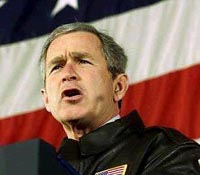For a productive new approach in the Middle East
Can you have a militarily 'occupied democracy'? To ask the question is to answer it. When a foreign army occupies a country by force, the population cannot be in control of its destiny, whatever the language spoken by the local puppet government. This is an oxymoron. That is the reason there could never be democracy in occupied Iraq or in occupied Afghanistan. It is only, if ever, when foreign troops leave or are kicked out that the national government in these lands can regain its legitimacy and authority.

This is a basic truth that the American president, George W. Bush, seems to have trouble understanding. In order to mobilize American public opinion behind his failed policies, Bush II is forced to rely on incendiary vocabulary to present his 'war on terror', an empty phrase, as a war against terrorists in Iraq. For example, there may be so-called 'terrorists' in Iraq, but there were none before the Bush-Cheney administration decided to invade that country on March 20, 2003, and they are not the worldwide terrorists à la al Qaeda who want to do damage to the United States. The 'al Qaeda terrorists' who have a beef against the U.S. are not in Iraq; they are in Pakistan, Yemen, Saudi Arabia, the U.K. ...etc. Most of the insurgents in Iraq are not terrorists, but patriots who are fighting a foreign invader. That would be the case if the United States were invaded by a foreign enemy: Americans would fight the invaders. To fight an invader is not a terrorist act but a patriotic act. For Bush, "to stay the course" in Iraq is not a policy; it is stubbornness and a lack of vision.
By gratuitously and illegally attacking, invading and occupying Iraq on March 20, 2003, for reasons that Bush himself says had nothing to do with 9/11 and terrorism, as he openly conceded during his August 21 (2006) news conference, while continuing to babble the word "democracy", the American president is not only giving the great institution of democracy a bad name, but he has turned hundreds of millions of moderate Muslims against the West and its humanistic values. And, to make matters worse, by pushing Israel to attack and destroy the country of Lebanon, while closing his eyes on the sufferings that Israel imposes daily on the Palestinians, George W. Bush has brought upon himself the contempt and anger of most of the world. As a result of his misguided policies and dumb pronouncements, Bush has only succeeded in presenting western interventions in Iraq and Afghanistan as 19th Century colonial and imperialistic adventures. In this sense, George W. Bush and his cohort of Neocon advisers are truly men of the 19th Century, not of the 21st Century. In this day and age, such a policy is a dead-end approach. It can only lead todisaster.
What would be called for, at this juncture, is an international conference, preferably under the auspices of the United Nations, on the future of Iraq and of the Middle East region and their inhabitants. This may be the only way to stop the Iraqi civil war that Bush denies but that the Pentagon confirms is going on in Iraq. A first obvious objective would be to divert the current unproductive military expenditures toward a Marshall-like Plan to raise standards of living in that part of the world. A second imperative objective would be to adopt a plan with teeth to stop, once and for all, the lawlessness that prevails in Israel-Arab relations. I suspect that most Israelis and most Palestinians are war weary and would accept a viable compromise wrought in good faith.
If no credible leadership pushes events in that rational direction, the laws of inertia and of unintended consequences will move things toward chaos and ever more escalading conflicts.
Since the U.S. is so deeply involved in the current international mess, a reappraisal of the situation would require fundamental changes in the Bush administration's approach to international problems. This could be difficult, but surely not impossible, for the American president to, first, stop being under the dominating influence of his vice-president, and reassert his authority to formulate foreign policy, and -second, place the interests of the pro-Israel Lobby in a more balanced perspective within American foreign policy. This would require a change of personnel, but other presidents, Ronald Reagan for example, did it with success.
The new American foreign policy toward the Middle East should take a leaf from the 1975 Helsinki Accords and the new productive approach toward the Soviet Bloc. The world needs a policy of 'detente' in the Middle East. Western leaders should start telling all moderate Muslims, and they are the vast majority, 1- that their country, their culture and their religion will henceforth be respected; and 2- that democratic countries will assist them in their development, but will not dictate to them what political systems and what institutions they must adopt.
The current American administration is scheduled to remain in office until January 2009. The U.S. and the world cannot afford two more long years of amateurism, improvisation and failure. Let us hope that the world of today can generate leaders of vision of the type found in the past, with Marshall, Acheson, Kissinger, Brzezinski, Baker,...etc.
Rodrigue Tremblay
Rodrigue Tremblay is professor emeritus of economics at the University of Montreal and can be reached at rodrigue.tremblay@ yahoo.com. He is the author of the book 'The New American Empire'.
Subscribe to Pravda.Ru Telegram channel, Facebook, RSS!





